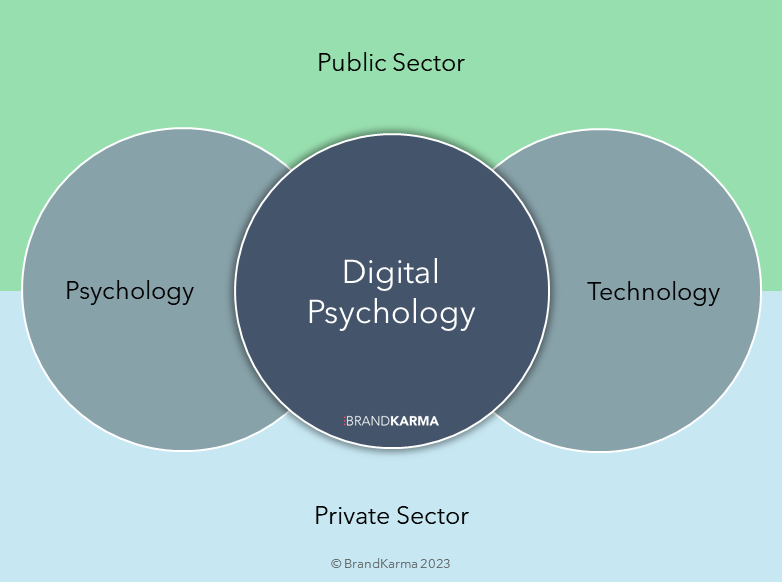UNLOCKING HUMAN-CENTERED SUCCESS THROUGH DIGITAL PSYCHOLOGY
by Laura Modre & Eliot Mannoia // October 1, 2023
reading time: 6 minutes

© Thisisengineering
Technology’s pervasive role in our digital world significantly shapes our thoughts, behaviours, and emotions. While this can have negative effects on individuals and society that must be managed, technology also offers great potential for benefiting people and businesses if used effectively. To harness innovation, productivity, and well-being, it’s crucial to focus on human experiences, needs, and values in both tech and non-tech solutions. Digital psychology combines psychology and behavioural economics principles with insights from science and technology studies. It emphasizes a human-centric approach to digitalisation, tackling challenges like enhancing empathy in digital and analogue communication, creating efficient workflows, leveraging AI as a creative and productive collaborator, and improving human-computer interfaces. By valuing human-centered technology design and use, digital psychology aims to enhance people’s digital experiences by blending psychological insights with technology. It posits that true growth and innovation in business and society hinge on keeping humanity integral to digitalisation processes.
In this age of rapid technological advancement, from exponential to double exponential curves, society and businesses are continuously challenged to evolve and adapt to a changing landscape. While the successful integration of digital technologies and artificial intelligence can improve processes and decision-making, it becomes more crucial than ever to consider the people who sit at the other end of these technologies. Indeed, prioritising the experiences that all of us – employees, customers and other stakeholders – have while interacting with technology, and artificial intelligence, not only makes these interactions more human-centered but also fosters safety, innovation and growth.
At companies this can be achieved through the lens of digital psychology, by improving the experiences and interactions that people have at various touchpoints. By asking questions such as:
- How can technology be integrated best to improve companies’ internal communication and processes, to help make them more satisfied, effective, efficient, and empathetic?
- How can employees leverage artificial intelligence to ease their workload, thereby freeing up cognitive resources to enhance creativity, innovation, and performance for more challenging tasks?
- How can subtle redesigns of products, services or interfaces increase user and customer satisfaction?
- What purpose does technology serve employees and customers? Which experiences can be improved through technology and AI and when and where are analogue solutions more beneficial?
The objective of the discipline digital psychology is to align people and technology to enable all the benefits of human-centricity. It is not us that should adapt to technology, but technology that should be purposefully tailored to our needs. Through experience architecture, each specific and granular human-computer interaction can be (re)designed to ensure an optimal experience. At companies, we believe that doing so will unlock their full potential.
What is Digital Psychology?
Digital Psychology …
- aims at making the implementation of technologies more human-centered
- integrates insights from psychology and technology
- encourages society and businesses to improve people’s experiences
Developed and coined by BrandKarma, “Digital Psychologists” can be defined as an innovative approach to making technology in society and businesses more human. By integrating insights from psychology, behavioural economics and human-computer interaction, digital psychology aims at bringing a more comprehensive, human-centred perspective to our interaction with technology. Especially with the increasing use of new technologies and artificial intelligence, it becomes more and more important to consider both the benefits and constraints of these tools. Digital psychology therefore sits at the intersection of psychology and technology and strives towards improving experiences, partly by harnessing technology, but also by harnessing traditional, “human” approaches and practices. It looks at how humans interact with and respond to the products and services offered, or the technologies employed by a business and considers the needs, desires, cognitive processes, and biases involved in shaping people’s experiences in connection to a given company or institution.
As such, digital psychology is the discipline considering human needs and desires in any interaction or transaction and to improve these touchpoints through a carefully designed synergy of technological and analogue means.

Digital Psychology: e.g. human centricity, improved human-computer interaction, human-centered innovation, digital humanism, greater human/machine efficiencies, greater satisfaction and performance
Psychology: e.g. behaviourism, cognitive psychology, social psychology, organisational psychology, humanistic psychology, developmental psychology
Technology: e.g. process optimisation, robotics, artificial intelligence, innovation, mobility, data science
Public Sector: e.g. government, education, NGO’s, culture
Private Sector: e.g. partners, shareholders, customers, employees
Digital Psychologists Improve Stakeholder Experiences
By placing digital psychology at the intersection of technology and psychology, digital psychologists look at what kind of technology and artificial intelligence can be used to improve the employee and customer experience (EX and CX respectively). By focusing on the value that such technologies hold, digital psychologists provide strategies to shift businesses’ perspective towards the human involved in the interaction not only with this technology, but by extension also with the organisation. However, more than simply spurring the integration of technological tools, digital psychologists also examine the interplay of people and technologies to ensure positive experiences and to reduce overwhelming technological experiences and digital fatigue. Considering this, digital psychologists aim at satisfying peoples’ (employees’ and customers’) needs to improve their experiences with products, services or interfaces, thus, making society more emotionally intelligent and .
When a more human-centred approach is taken at companies, they experience greater performance by benefitting from more satisfied employees, leading to greater retention, more efficiency and productivity. Similarly also from more satisfied customers, leading to increased customer loyalty and customer lifetime value.
Digital psychologists at BrandKarma work with “The 10 Psychological Dimensions of Experience Architecture”, a framework developed by the company’s founder Eliot Mannoia. This framework identifies ten crucial psychological dimensions that should be satisfied by any product, service, or interface to ensure baseline and exceptional experiences for the relevant stakeholder. The framework can be applied to a variety of business processes and any industry to enhance the human-centricity of the company. Guided by this framework, digital psychologists identify gaps in the fulfilment of each dimension and provide solutions that are grounded in psychological research to adapt and re-design a specific touchpoint, or experience under analysis. These solutions frequently include the adoption of technology and artificial intelligence, circling back to the strong intersectionality and integration of psychology and technology.
The Impact of Digital Psychology on Business Performance
Humans, technology and business are inextricably linked. Whether as customers, employees or suppliers, humans arguably still remain at the centre of business by purchasing companies’ products and services, working to produce these products and services and ensuring smooth operations. Therefore, the human at the centre of these processes should not be taken for granted or disregarded simply for the sake of economic objectives. Indeed, digital psychology argues that a more human-centred approach not only makes businesses more human, emotionally intelligent, and innovative, but it also leads to overall improvements in performance and success. Digital psychologists assert that human-centric es, meaning also more multi-faceted businesses, are linked to greater growth, innovation and diversity and suggest that improvements to people’s experiences and touchpoints with the business can result in company-wide gains.
When companies become more attentive to stakeholder needs and prioritise a human-centred model supported by technology and artificial intelligence, they experience:
- reduced employee turnover due to higher purposefulness and work satisfaction
- better employee performance due to higher engagement, attention and energy
- higher diversity and fairness towards employees and customers due to reduced human bias in hiring processes, performance reviews, or customer service
- increased revenue due to higher customer satisfaction and loyalty

© Cottonbro
All in all, digital psychology is an exciting and innovative interdisciplinary field that strives for the successful cooperation and alignment of humans and technology to enhance the experiences for everyone involved. This is achieved by fulfilling the ten fundamental psychological dimensions of experience architecture, consequently leading to an improvement in overall business performance. Digital psychology therefore looks at how new technologies can be used in light of human needs and also how technology affects people in various contexts. Through this lens, it seeks to optimise any given technology used and to provide value for people and their experiences.
#brandkarma #digitalpsychologist #emotionalintelligence #steakholder #economy #business #technology
Sources:
Harvard Business Review, 6 Ways To Build a Customer Centric Culture
Forbes, How Artificial Intelligence Can Boost Diversity and Inclusion
National Fund, Human-Centered Workplace Guide
Springer Professional, Kundenzentrierte Strategien Machen Erfolgreicher
Sloan Review, Using Artificial Intelligence To Promote Diversity
